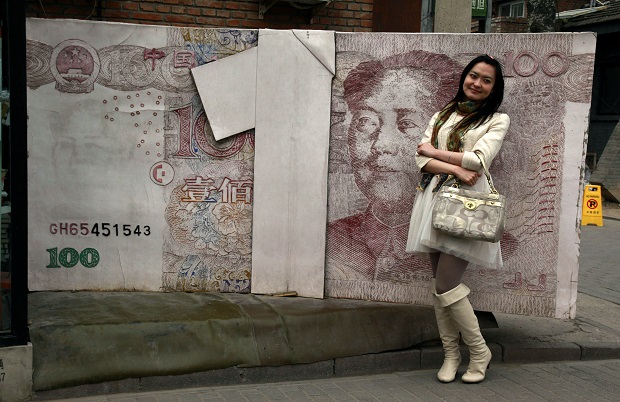
In this March 15, 2012 file photo, a Chinese woman poses for photos near a sculpture depicting a Chinese yuan note at an art district in Beijing, China. China devalued its tightly controlled currency on Tuesday, August 11,2015, following a slump in trade, triggering the yuan’s biggest one-day decline in a decade. The central bank said the yuan’s 1.9 percent fall was due to a change aimed at making its exchange rate controls more market-oriented. But any change raises the risk of tensions with China’s trading partners. AP
BEIJING, China — China rattled global financial markets Tuesday by devaluing its currency — an effort, in part, to revive economic growth.
The yuan’s value declined 1.9 percent, its biggest one-day drop in a decade. The move could help Chinese companies by making their products less expensive in global markets. U.S. stocks plummeted, partly on fears about a worsening economic slowdown in China.
WHAT EXACTLY DID CHINA DO?
China doesn’t let its currency trade freely in financial markets as the United States does. Instead, it links the yuan’s value to the U.S. dollar. Then it restricts trading to a band 2 percent above or below a daily target set by the People’s Bank of China. On Tuesday, the central bank set the target 1.9 percent below Monday’s level — the biggest one-day change in a decade. It also made a technical change to give market forces more influence in determining the yuan’s value: Its daily target will now be based on the previous day’s closing value. That change will allow the yuan to make bigger, faster moves up or down and better reflect investors’ outlook on the prospects for China and its currency, said David Dollar, senior fellow at the Brookings Institution.
WHY DID CHINA DEVALUE ITS CURRENCY?
The People’s Bank of China said it acted because the yuan has been rising even when market forces say it should be falling. Worried Chinese have been moving money out of the country, putting downward pressure on the yuan. Yet the yuan has remained up anyway because of its link to the dollar, which has been rising. An overvalued yuan has hurt Chinese exporters by making their products more expensive overseas. In July, Chinese exports plunged 8.3 percent year over year.
China’s economy already needed help. The economy is expected to grow less than 7 percent this year, its slowest rate since 1990, and could decelerate even more next year. The stock market has been in a freefall since June.
“This move won’t solve some of the pressing problems China faces,” Sung Won Sohn, an economist at California State University Channel Islands, cautioned in a research note. “There is too much excess capacity, especially in basic industries like steel, aluminum … A real-estate bubble is alive and well. Chinese banks are loaded with a lot of problem loans. The gyration in the stock market won’t go away. ”
HOW WILL CHINA’S TRADING PARTNERS BE AFFECTED?
Investors fear the worst. U.S. stocks sank Tuesday, dragged down by falling shares in such big exporters as Caterpillar and General Electric. In theory, a weaker yuan could reduce exports of U.S. goods to China, already down nearly 5 percent this year through June.
But economists doubt that a one-day 2 percent drop in the yuan — a move China has called a one-time event — will do much damage to exports from the United States or other countries.
“Two percent is no big deal,” said Mark Zandi, chief economist at Moody’s Analytics. “Ten percent over the next few months would be a big deal.”
American politicians, who have long charged that China keeps its currency artificially low to give its exporters an edge, denounced the devaluation. “Today’s news that China has yet again lowered the value of its currency is another harsh reminder that we cannot afford to sit idly by as China refuses to play by the rules,” Ohio Republican Sen. Rob Portman said in a statement.
But economists didn’t see Beijing’s move as an effort to defy market forces and reduce the yuan to an artificially low level. Rather, they perceived an attempt by China to catch up to an economic reality that dictates a cheaper yuan. And the plan to let market forces play a bigger role in determining the yuan’s level is something the U.S. government itself has called for.
In a statement, the U.S. Treasury Department said: “China has indicated that the changes announced today are another step in its move to a more market-determined exchange rate. We will continue to monitor how these changes are implemented and continue to press China on the pace of its reforms.”
MIGHT THE FEDERAL RESERVE DELAY A RATE HIKE?
Probably not. True, a cheaper yuan hurts U.S. exporters and likely depresses U.S. inflation, which is already below the annual 2 percent rate the Fed targets. But Tuesday’s move wasn’t big enough by itself to make much difference. So the Fed is likely to go ahead, possibly at its September meeting, and raise the short-term rate it controls, which has been pinned near zero since 2008. The U.S. economy grew at a steady 2.3 percent annual from April through June, and U.S. unemployment has fallen to a seven-year low 5.3 percent.
If the U.S. economy continues to look healthy, wrote JP Morgan Chase economist Michael Feroli, “the yuan move will largely be a sideshow ” by September’s Fed meeting.

